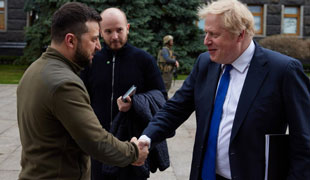
Johnson arrived in Kiev Saturday to meet Ukrainian President Volodymyr Zelensky. COURTESY PHOTO
Beijing, China | Xinhua | Relevant parties are working to broker a peaceful solution to the Russia-Ukraine conflict. The following are the latest developments:
The conflict between Russia and Ukraine, the world’s major exporters of foodstuffs, will impact 25 percent of the global grain market, a Ukrainian official said Saturday.
The conflict will lead to a reduction in grain supplies, an increase in food prices, and worse access to food, especially wheat, in importing countries, said Taras Kachka, deputy minister for economic development, trade and agriculture of Ukraine.
Ukrainian seaports, the main routes for grain exports, have been blocked, Kachka added.
– – – –
British Prime Minister Boris Johnson on Saturday vowed to provide more economic and military assistance to Kiev amid the Ukraine-Russia conflict after meeting with Ukrainian President Volodymyr Zelensky.
Johnson arrived in Kiev earlier on Saturday for a one-day visit.
– – – –
Payment in rubles for Russian gas is not a violation of European Union sanctions, Hungarian government spokesperson Zoltan Kovacs said on Saturday.
“The EU so far has no common procurement of gas and oil for European countries. So as we speak, we still go by alongside those contracts we have with Russians regarding gas and oil, and according to those contracts, it is a technical issue, in what currency we have to pay,” Kovacs said in an interview with CNN, which was posted on his Twitter page.
– – – –
Canadian Prime Minister Justin Trudeau on Saturday spoke with Ukrainian President Volodymyr Zelensky.
Trudeau also announced Saturday an additional 100 million Canadian dollars (about 80 million U.S. dollars) in humanitarian support to provide added emergency health services, including trauma care, protection, and necessities such as shelter, water, and food.
– – – –
The European Union (EU) will ban Russian coal from August, as part of the fifth package of sanctions against Russia.
“The package comprises a prohibition to purchase, import or transfer coal and other solid fossil fuels into the EU if they originate in Russia or are exported from Russia, as from August 2022,” read a press release published Friday by the Council of the EU.
Imports of coal into the EU are currently worth 8 billion euros (about 8.7 billion U.S. dollars) per year. ■
 The Independent Uganda: You get the Truth we Pay the Price
The Independent Uganda: You get the Truth we Pay the Price



